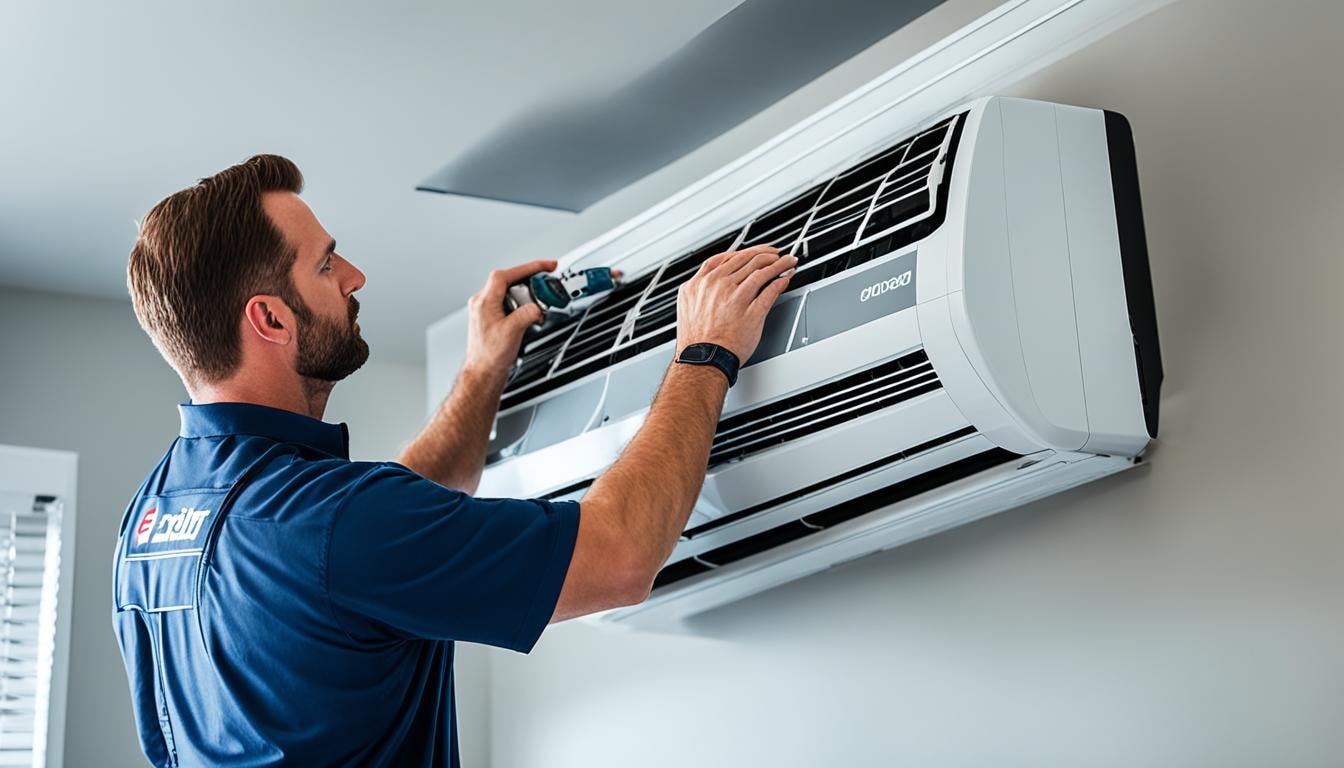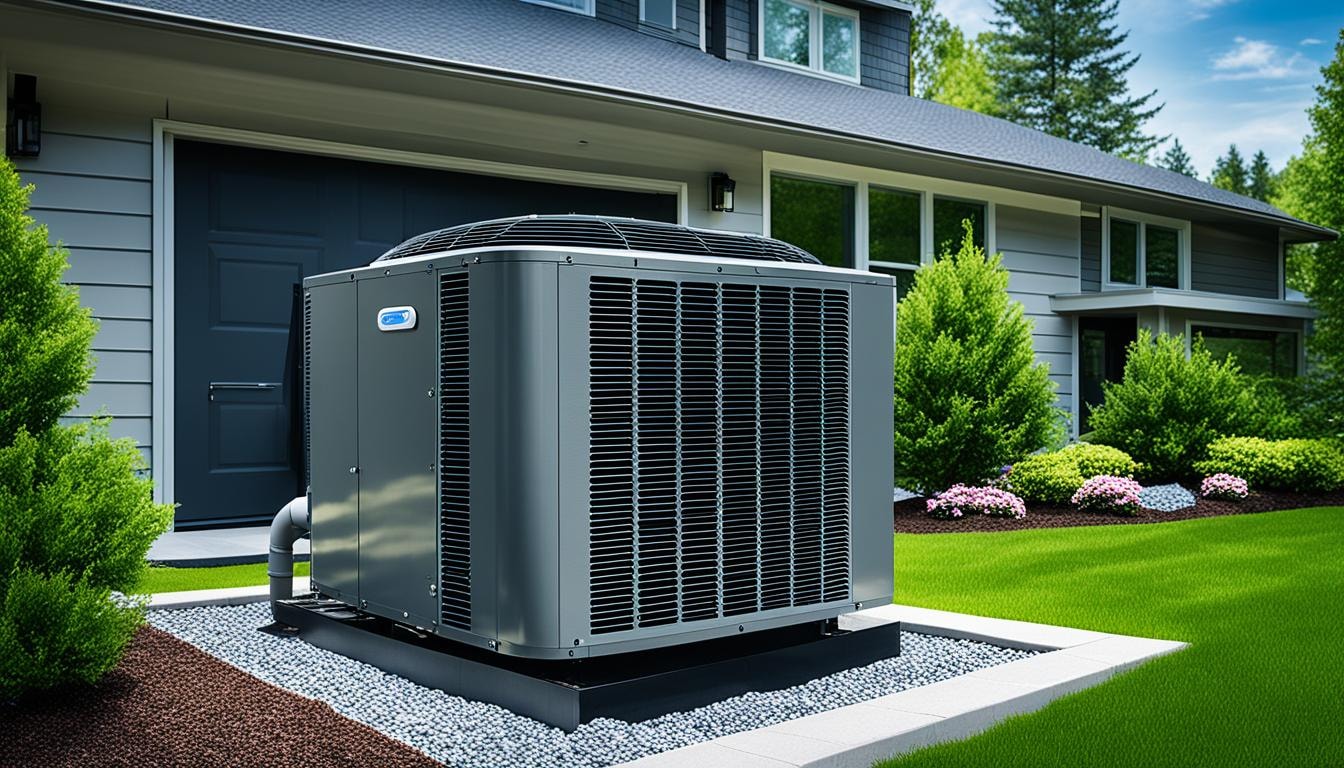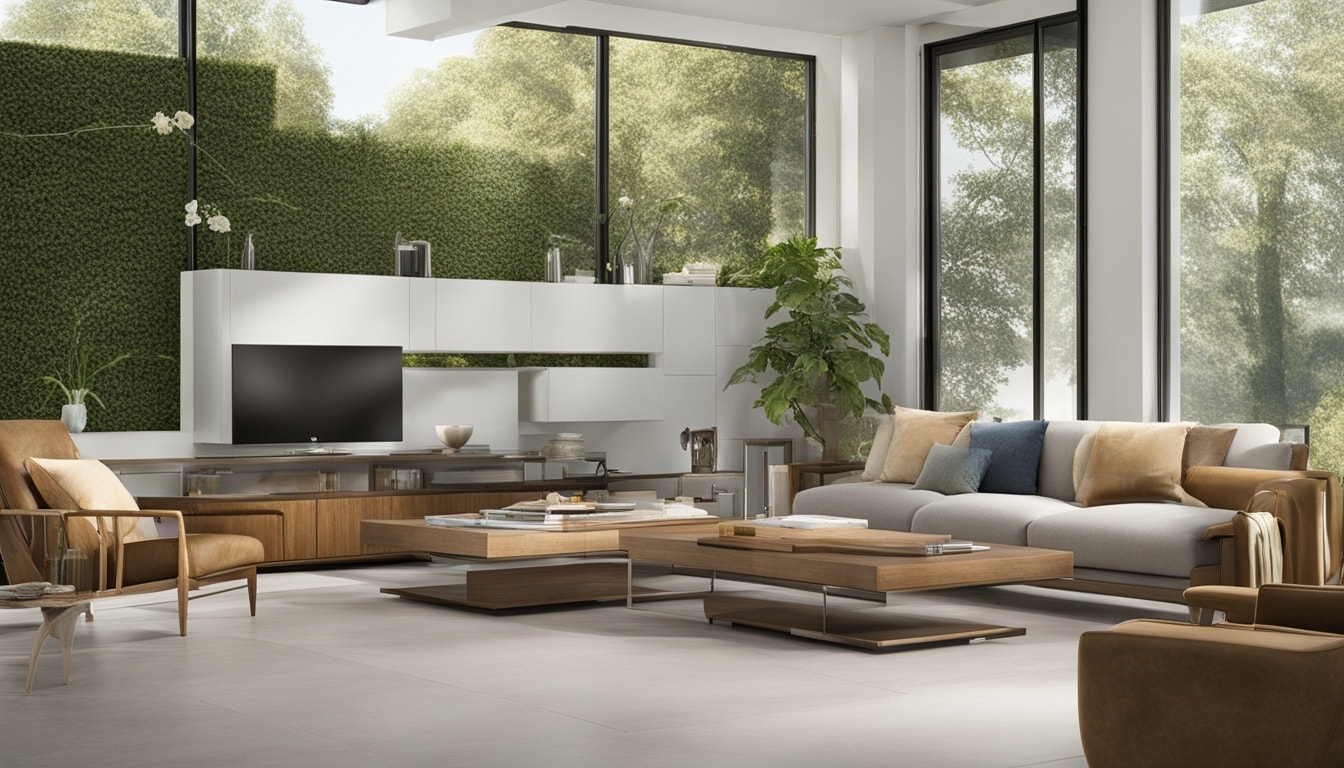Air Conditioner Installation Near You
Can’t find what you are looking for?
How It Works
-
Answer a few questions about your home project.
-
Within seconds, get matched with top-rated local pros.
-
Compare quotes and choose the best pro for the job.
Air Conditioner Installation In Your Area
Air Conditioner Installation: A Comprehensive Guide for Homeowners
Keeping your home cool and comfortable is important. A good air conditioning system is key. But, how do you start with installing or replacing one? This guide will help you with the steps and things to think about for air conditioner installation. It will make sure your home stays cool and saves energy.
Are you not sure about the best air conditioning system for your home? Wondering about the costs of installation? This article will give you the details you need. It will help you make smart choices and enjoy the perks of a well-installed air conditioning system.

Key Takeaways
- Central air systems are the most common type of air conditioning system for homes and buildings.
- Window units offer a cost-effective solution for cooling individual rooms, while split systems provide targeted cooling in specific areas.
- Proper sizing and placement of the air conditioning unit are crucial for optimal efficiency and performance.
- Scheduling air conditioning installation during the spring or fall can lead to cost savings and a smoother installation process.
- Choosing a reputable HVAC contractor with positive reviews and qualified technicians is essential for a successful installation.
Understanding Central Air Conditioning Systems
Central air conditioning systems are the top choice for cooling a whole house. They have an outdoor unit and an indoor coil. There are two main types: split systems and packaged systems.
Types of Central AC Units
Split systems have an outdoor unit and an indoor air handler. Packaged systems put everything in one outdoor unit. Ductless systems cool certain areas without needing lots of ductwork.
Factors Affecting Air Conditioning Costs
The cost of a central air conditioning system depends on several things. These include the home’s size, the system’s energy efficiency, and the ductwork’s complexity. Homeowners should think about these factors. They should choose a system that fits their cooling needs and saves energy and money over time.

Determining the Right Air Conditioning Unit for Your Home
Choosing the right air conditioning unit is key for cool and cost-saving cooling. You need to think about your home’s size, insulation, and how much energy you want to use. A pro HVAC contractor can help pick the best unit for you.
They look at your home’s layout and what you like for cooling. For big homes, you might need a big right air conditioning unit. But for small spaces, a portable unit could be enough.
The size of the unit is measured in BTUs. A good rule is about 20 BTUs per square foot. If the unit is too big, it will cool too fast and use more energy. If it’s too small, it won’t cool well and will use more energy bills.
The type of unit also matters for energy use. Typically wall mounted units like central air are more efficient. They cool your home evenly. A pro hvac installation makes sure you get the right unit and it works well.

Air Conditioner Installation: What to Expect
Getting a new air conditioner is exciting but can feel overwhelming. Knowing what happens during installation helps. It’s important to work with skilled HVAC pros. They will guide you from the start to the end of the process.
Pre-Installation Evaluation
A licensed HVAC tech starts with a detailed check-up before installing your air conditioner. This step helps pick the right size and figure out if you need new ducts. They’ll look at your current system and suggest updates or a full replacement if needed.
Ductwork and Ventilation Requirements
Good ductwork and ventilation are key for your air conditioner to work well. The tech will check your ducts and see if they need changes. They might need to make them bigger or change their layout for better airflow and temperature control in your home.
- Inspect and clean existing ductwork
- Identify and address any air leaks or restrictions
- Ensure adequate ventilation for the new air conditioning system
- Consider upgrading to a more efficient split system or window units if applicable
- Replace or clean evaporator coils as needed
Fixing ductwork and ventilation during installation makes your new air conditioning systems work better and save energy. This means a cooler and cheaper home.
Energy Efficiency and SEER Ratings
Energy efficiency is key when it comes to air conditioning. The SEER (Seasonal Energy Efficiency Ratio) rating shows how well a system uses energy. A higher rating means it’s more efficient.
Most homeowners choose air conditioners with SEER ratings between 15 and 18. These units balance cost and savings on bills. But, air conditioners with ratings over 16 can save more money over time.
- The minimum SEER rating for new air conditioners will go up to 14 for northern states and 15 for southern states in 2023. This is to make them more energy-efficient.
- Going from a 14 SEER to a 16 SEER unit costs extra, about $900 to $1,500. A 21 SEER unit could cost $3,000 to $5,000 more.
- Fixing high SEER systems can be pricey. A 21 SEER system might cost $2,000 for a compressor fix.
The Energy Guide label shows the SEER rating and energy usage info. It helps homeowners make smart choices. Even though high-efficiency air conditioners cost more upfront, they save money over time. This makes them a good choice for those wanting to save on energy.
Air Conditioner Installation Costs
The cost to install an air conditioner changes a lot. It depends on the unit’s size and your home’s size. Bigger homes need stronger and pricier air conditioners. The cost also changes based on how hard it is to install and if you need to change ductwork.
Square Footage and Unit Size
Installing a central air system costs between $3,800 and $7,700. It depends on the unit’s size. For homes of 750 to 1,500 square feet, a 1.5 to 3-ton unit costs $2,500 to $4,500 to install.
Larger homes up to 3,000 square feet might need a 4 to 5-ton unit. This can cost $4,500 to $6,800 to install.
Labor and Professional Installation Fees
Labor and professional fees add a lot to the cost. HVAC contractors charge $75 to $250 per hour. The average installation takes about 8 hours.
This means labor costs can be from $640 to $2,000. It depends on how complex the job is.
It’s key to hire a licensed and skilled HVAC contractor. They make sure the system is installed right. This can lower your energy bills and make the system last longer. It’s important to install the indoor and outdoor units, refrigerant pipes, and ductwork correctly for the air conditioner to work well.
Lowering Air Conditioning Installation Costs
Homeowners can save money on air conditioner installation by planning smart. Installing during the off-season can lead to lower costs. This is because there’s less demand for HVAC services.
Looking for rebates and tax credits can also cut costs. Many companies and governments offer programs to help with energy-efficient upgrades. This includes new air conditioning systems.
Working with a trusted HVAC contractor can also save money. They can give a free consultation to help find the best and most affordable option. This could be a window unit, a portable system, or a ductless or ducted system.
Off-Season Installation
Installing your air conditioner in the off-season can save a lot. This is usually in spring or fall. Contractors often give discounts on labor and equipment during these times.
Rebates and Tax Credits
Homeowners should look for rebates and tax credits to lower installation costs. These programs are given by utility companies, local governments, and the federal government. They aim to promote energy-efficient home improvements.
Financing Options for Air Conditioner Installation
Getting a new air conditioner can cost a lot. Luckily, there are ways to pay for it over time. These options make getting an air conditioner easier for homeowners.
Personal loans are a common choice. Companies like Discover Personal Loans and Upgrade offer these loans. They have interest rates from 6.99% to 35.99% and can lend up to $100,000. You can pay back these loans in one to seven years.
- Discover Personal Loans: 7.99% to 24.99% APR, $2.5K to $40K loans
- Upgrade: 8.49% to 35.99% APR, $1K to $50K loans
- First Tech Credit Union: 8.99% to 18.00% APR, $500 to $50K loans
- Upstart: 7.80% to 35.99% APR, $1K to $50K loans
- Best Egg: 7.99% to 35.99% APR, $2K to $50K loans
- LendingPoint: 7.99% to 35.99% APR, $2K to $37K loans
- LightStream: 6.99% to 25.49% APR, $5K to $100K loans
Homeowners can also look into home equity loans or HELOCs for financing. These use your home’s value and usually have lower rates than personal loans. But, think about the good and bad before choosing.
Choosing the right financing can make getting an air conditioner easier. It helps homeowners plan for the costs over time.
Maintaining Your New Air Conditioning System
Keeping your new air conditioning system in good shape is key. This means getting regular check-ups, cleaning the outdoor condenser unit, and changing air filters as the maker says. Doing these things can make your AC last longer, use less energy, and save you money on bills.
Changing air filters often is important. You should swap them out every one to two months when it’s cooling down, or more if your house is dusty or you have pets. If you don’t change them, your AC might use 5% to 15% more energy.
Cleaning the condenser unit outside is also a must. You should clean the coils once a year to stop dirt from blocking airflow. This keeps your AC running well. Also, make sure the outdoor condenser is clear of leaves and other stuff to help it work right.
- Regularly replace or clean air conditioner filters to lower energy consumption by 5% to 15%.
- Clean the evaporator and condenser coils annually to prevent dirt buildup and maintain efficiency.
- Ensure the outdoor condenser is free from debris for optimal airflow and performance.
- Hire a professional service technician if the old unit fails to cool properly, ensuring a thorough inspection and repair of the system.
By taking good care of your new unit, you can make it last longer and use less energy. It will also help keep your bills down. Don’t forget to get regular check-ups from a pro to keep your AC running smoothly.
Find the Perfect HVAC Pro with FindPros
Are you ready to cool your home efficiently and effectively? At FindPros, we make the process of selecting and installing the perfect air conditioning system simple and stress-free. By filling out our quick survey, you’ll gain access to top-rated local HVAC professionals who compete for your project, ensuring you get the best pricing available.
Our platform not only helps you find the right pros but also allows you to compare quotes and select the contractor you connect with best. With just a few questions about your home project, you can be matched with experts who understand your unique cooling needs. Experience the benefits of a well-installed air conditioning system and enjoy a comfortable home all year round. Let FindPros guide you to the best options today!
Conclusion
Getting a new air conditioning system is a big step. It makes your home more comfortable and saves energy. Knowing what affects the cost, finding ways to save money, and getting the right financing helps homeowners make smart choices.
Whether it’s just one room or your whole house, the right air conditioner and setup are key. Choosing a system with a good SEER rating means you’ll be cool and save on bills.
Working with a skilled HVAC expert and keeping up with maintenance keeps your air conditioner running well. Fixing small problems early and being proactive helps your system last longer and saves money on big repairs. A good air conditioning system and proper care make your home more comfortable and save money.
Frequently Asked Questions (Air Conditioner Installation)
MOST POPULAR CITIES
Browse by State- Alameda
- Costa Mesa
- Laguna Beach
- Orange
- Alhambra
- Culver City
- Lancaster
- Oroville
- Anaheim
- Daly City
- Livermore
- Oxnard
- Antioch
- Davis
- Lodi
- Pacific Grove
- Arcadia
- Downey
- Lompoc
- Palm Springs
- Bakersfield
- El Centro
- Long Beach
- Palmdale
- Barstow
- El Cerrito
- Los Angeles
- Palo Alto
- Belmont
- El Monte
- Malibu
- Pasadena
- Berkeley
- Escondido
- Martinez
- Petaluma
- Beverly Hills
- Eureka
- Marysville
- Pomona
- Brea
- Fairfield
- Menlo Park
- Port Hueneme
- Buena Park
- Fontana
- Merced
- Rancho Cucamonga
- Burbank
- Fremont
- Modesto
- Red Bluff
- Calexico
- Fresno
- Monterey
- Redding
- Calistoga
- Fullerton
- Mountain View
- Redlands
- Carlsbad
- Garden Grove
- Napa
- Redondo Beach
- Carmel
- Glendale
- Needles
- Redwood City
- Chico
- Hayward
- Newport Beach
- Richmond
- Chula Vista
- Hollywood
- Norwalk
- Riverside
- Claremont
- Huntington Beach
- Novato
- Roseville
- Compton
- Indio
- Oakland
- Sacramento
- Concord
- Inglewood
- Oceanside
- Salinas
- Corona
- Irvine
- Ojai
- San Bernardino
- Coronado
- La Habra
- Ontario
- San Clemente